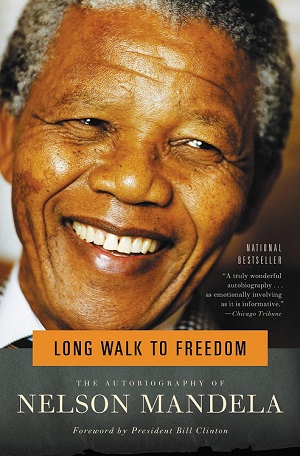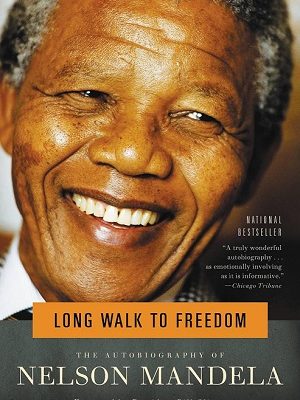Long Walk to Freedom: The Autobiography of Nelson Mandela offers a powerful, comprehensive look at Nelson Mandela’s journey from a young boy in rural South Africa to becoming the first black president of the country and a global icon for justice and peace. The lessons derived from this book encapsulate themes of perseverance, leadership, justice, forgiveness, and the indomitable human spirit. Below are 21 lessons from the book:

Read also: Young Mandela
1. Perseverance in the Face of Adversity
- Nelson Mandela’s life is a testament to the power of perseverance. Despite enduring 27 years in prison, Mandela never lost sight of his goal to liberate South Africa from apartheid. This lesson teaches the importance of resilience and determination, especially when facing long-term challenges. Through Mandela’s example, readers learn that true success often comes after enduring great hardships.
2. The Power of Education
- Education played a pivotal role in Mandela’s life, as it does in his autobiography. He highlights the importance of self-education and how it empowered him, even during his imprisonment on Robben Island. This lesson demonstrates that education is a powerful weapon that can transform individuals and societies, emphasizing its role in creating change.
3. Leadership Through Service
- Mandela’s leadership style was one of service rather than domination. Throughout the book, he emphasizes that true leaders put the needs of their people first, even at great personal cost. This lesson underscores the principle that leadership is about serving others and taking responsibility for the well-being of the collective.
4. The Importance of Sacrifice
- Mandela sacrificed his personal freedom, family life, and well-being for the larger cause of fighting apartheid. This lesson teaches that true leadership and progress often require sacrifices, whether personal or professional. Mandela’s unwavering commitment to the cause illustrates that enduring sacrifices can lead to far-reaching, meaningful change.
5. The Strength of Forgiveness
- One of the most powerful lessons from Mandela’s autobiography is the strength of forgiveness. After enduring decades of imprisonment and mistreatment, Mandela chose to forgive his oppressors rather than seek revenge. This decision was key to South Africa’s peaceful transition to democracy. Forgiveness, Mandela shows, is not a sign of weakness, but a powerful tool for healing and reconciliation.
6. Unity and Collaboration
- Mandela’s belief in unity, even across racial and political divides, is a central theme in “Long Walk to Freedom.” He worked with both allies and former enemies to dismantle apartheid and build a democratic South Africa. This lesson teaches that collaboration and unity, even with those who hold opposing views, are essential for achieving lasting peace and progress.
7. The Importance of Self-Reflection
- Mandela consistently reflects on his life’s journey, examining his actions, mistakes, and triumphs. This lesson emphasizes the importance of self-reflection in personal growth and leadership. By being honest with ourselves and learning from our experiences, we can make better decisions and become more effective in our pursuits.
8. Patience is Crucial for Change
- Mandela’s 27 years in prison serve as a testament to the necessity of patience in achieving long-term goals. He waited decades for the fruits of his labor, showing that meaningful change often takes time. This lesson is vital for those working toward social justice or personal ambitions—change doesn’t happen overnight, but persistence pays off.
9. Never Compromise on Your Values
- Throughout his life, Mandela held firm to his principles and values, even when it would have been easier to compromise. This lesson teaches that standing by your values, even in the face of immense pressure, is a sign of true integrity and strength.
10. Hope as a Driving Force
- Hope was central to Mandela’s journey. Even during his darkest days in prison, he never lost hope that South Africa could one day be free. This lesson is a reminder that hope can be a powerful motivator, helping individuals overcome challenges and continue striving toward their goals.
11. Empathy and Understanding
- Mandela’s ability to empathize with others, even his oppressors, played a significant role in his leadership. He made a concerted effort to understand the fears and concerns of South Africa’s white minority, which helped ease tensions during the transition to democracy. This lesson highlights the importance of empathy in resolving conflicts and leading with compassion.
12. The Role of Collective Action
- Mandela repeatedly emphasizes that his achievements were not the result of his efforts alone but were made possible through collective action. The African National Congress (ANC), his comrades, and global anti-apartheid activists were all crucial in bringing about change. This lesson shows that collaboration and teamwork are essential in any struggle for justice or large-scale transformation.
13. Courage is Acting Despite Fear
- Courage doesn’t mean the absence of fear, but the willingness to act despite it. Mandela’s journey was marked by many moments of fear and uncertainty, but he chose to act with courage, knowing that his cause was just. This lesson teaches that fear is a natural part of any significant endeavor, but we must push through it to achieve our goals.
14. The Importance of Strategic Compromise
- While Mandela was unwavering in his values, he also understood the importance of strategic compromise. His willingness to negotiate with the apartheid government, despite his initial reluctance, helped pave the way for South Africa’s peaceful transition to democracy. This lesson teaches that flexibility and compromise are often necessary in negotiations and leadership.
15. Persistence in the Face of Failure
- Mandela faced numerous setbacks throughout his life, including multiple arrests, failed plans, and political struggles. However, he never gave up. This lesson emphasizes that persistence, even in the face of failure, is key to achieving one’s goals. Success is often preceded by failure, but those who persist will eventually triumph.
16. The Role of Culture and Identity
- Mandela deeply valued his cultural heritage and identity as a Xhosa, and he believed that understanding one’s roots is essential to personal strength. This lesson teaches that cultural identity and pride can be sources of power and resilience in the face of oppression.
17. Balancing Family and Leadership
- Mandela’s dedication to the anti-apartheid cause often came at the expense of his family life. He acknowledges this struggle in his memoir, showing that balancing personal responsibilities with public leadership is challenging but necessary. This lesson is important for leaders who must navigate the complexities of personal sacrifice in pursuit of larger goals.
18. Global Solidarity and Support
- The international community played a crucial role in supporting Mandela and the anti-apartheid movement. This lesson illustrates the power of global solidarity and activism in fighting for justice. It shows that collective pressure from the international community can help bring about change in oppressive regimes.
19. Overcoming Bitterness
- Mandela teaches the importance of not allowing bitterness or hatred to consume you, even when you have been deeply wronged. His ability to move beyond bitterness and embrace reconciliation is one of the most powerful messages of the book. This lesson is essential for anyone seeking personal or societal healing.
20. Justice is Worth Fighting For
- Throughout the autobiography, Mandela reiterates that the fight for justice is always worth the effort, no matter the cost. His lifelong dedication to fighting apartheid, often at great personal sacrifice, exemplifies this lesson. For those facing injustice, this is a reminder that the pursuit of justice, equality, and human rights is a noble and necessary cause.
21. True Freedom is Not Just Political
- While Mandela’s fight was for the political freedom of black South Africans, he also emphasizes that true freedom includes emotional, psychological, and economic freedom. This lesson teaches that liberation is multifaceted and goes beyond the absence of physical oppression. True freedom allows individuals to live with dignity, security, and equality.
Conclusion
Long Walk to Freedom offers readers a wealth of lessons on perseverance, leadership, forgiveness, and the power of the human spirit. Nelson Mandela’s life is an extraordinary example of how dedication, compassion, and resilience can bring about profound change. Each of these lessons can inspire individuals and leaders to create meaningful impact in their own lives and communities. Through Mandela’s journey, we learn that the road to freedom is long, but with determination, it is possible to achieve great things (Amazon).



